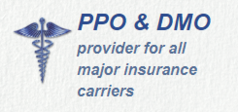
Dentists in Bullhead, AZ Answer Frequently Asked Questions
Below is a list of some of the questions we get asked most frequently from our patients. If you have a question that isn't answered below, feel free to give our Bullhead City, AZ dental practices a call and we'll be happy to assist you. Your dentists in Bullhead, AZ enjoy sharing dental knowledge and educating our patients.
- What is Periodontal Disease?
- Who is a Periodontist?
- How does an ongoing infection work?
- What can cause a “Burst” of infection activity?
- What are symptoms of a periodontal infection?
- What are the advantages of dental implants?
- Why all of a sudden is my dentist sending me to a periodontist?
- How is periodontal disease treated?
- Does periodontal treatment hurt?
- What is going to happen on my first visit?
- How much will treatment cost and will my insurance cover it?
- Why must I start treatment right away?
- What are the medical consequences if I delay treatment?
- How is my general dentist important to my periodontal care?
- What are the symptoms of periodontal disease?
- Do you use the latest equipment and techniques?
- What other treatments do you provide?
- How can I prevent periodontal disease?
Periodontal disease, (also known as "periodontal infection”, "gum disease”, pyrorrhea”) is an ongoing infection in the gums around the teeth. The cause of periodontal disease is infectious bacteria that gets deep into the gums.
This infection starts destroying the bone that supports the teeth. If left untreated, it can lead to tooth loss. For more information, please see the section entitled Periodontal Disease.
As a child, did you ever get a bad scrape that became red and swollen? That was caused by a bacteria that got under your skin and started an infection. It may have lasted for days or weeks. Finally, your immune system conquered the bad bacteria and the infection healed.
With an ONGOING infection, your immune system never wins the battle and the infection grows. Periodontal disease is an ongoing infection in the pockets around your teeth. Your immune system is losing the battle and, without treatment it will get worse.
People with periodontal disease have low resistance to periodontal bacteria. This is causes a continuing gum infection which grows in "bursts” of activity. Each time it grows, more support for your teeth is lost. Some factors that can cause a "burst” of activity are:
- Poor Oral Hygiene
- Dental Plaque
- Smoking
- Genetic factors
- Stress or tension
- Diet
- Age
- Illness
- Red or Swollen gums
- Aching, itchy, sore, or tender gums
- Receding gums (teeth beginning to look longer)
- Bad breath
- Any change in the way your teeth fit together when you bite
- Loose, separating or protruding teeth
- Spaces between teeth
In many instances, a dental implant can provide unequaled long-term natural and esthetic results. Since the implant crown is not soldered to adjust teeth, a more natural tooth shape can be achieved. This also make dental hygiene, especially flossing much easier.
A dental implant functions very much like a normal tooth. You will again be able to all of the foods you like without worrying about the condition of your smile.
A final critical benefit of dental implant is that it helps stimulate and maintain
the normal bone and soft tissues around the implant. This ensures you a beautiful smile that will
stay beautiful for many years to come.
Periodontists have advanced training in the treatment of periodontal disease and in the placement of dental implants.
Patients with periodontal infection show weakened resistance to periodontal bacteria. This causes a continuing gum infection that can grow in bursts of activity. Some factors that cause a dramatic increase in the severity of your periodontal disease are:
- Poor oral hygiene
- Plaque
- Smoking
- Genetic factors
- Stress
- Diet
- Age
- Illness
Two other important factors are:
- Lack of regular dental checkups
- Lack of regular dental cleanings
When your infection has a "burst” or growth, or when there are signs that this is my occur, your dentist may recommend periodontal treatment.
Periodontal disease is an infection in the gums and jawbone. The goal of the treatment is to remove this infection and prevent it from coming back. For more information, see the procedures page.
After your initial examination, we will completely explain the specific line of treatment required.
One of the primary concerns is that you remain comfortable during treatment. We offer an extensive array of the latest techniques to minimize discomfort. For more information on these techniques, see the procedures section.
Afterword, many of our patients say they are amazed at how little discomfort the experienced.
On your first visit to our office you will receive a periodontal examination. You should experience little to no discomfort during this examination. If necessary, x-rays will be taken to further evaluate any loss of bone around your teeth.
Afterword, our findings and your options for treatment will be thoroughly explained. The doctor will answer any questions you may have.
Our goal is that you leave with a complete understanding of your condition and the treatment needed to restore you to optimum oral health.
Everyone deserves to keep their natural teeth for a lifetime. While periodontal treatment is not as costly as replacing natural teeth do to tooth loss, its costs can vary greatly depending upon your needs.
If you have dental insurance, this may provide full or partial coverage. Our office will contact your insurance company to learn what they will cover.
We feel that finances should never be an obstacle to treatment. For your convenience, we offer several payment options. We also have payment plans to suit your individual needs. Our insurance coordinator will be happy to answer any of your financial or insurance questions.
Periodontal infection grows in "bursts of activity.”
It is likely that you have been referred to us because your general dentist has noticed an increase in infection activity.
This infection eats away at the bone that supports your teeth, leading to tooth loss. If not treated there can be a number of consequences.
Your general dentist knows your entire dental history, the condition of your teeth and your future dental needs. He or she is in charge of your overall dental care. We work closely with your general dentist to ensure you will receive the best possible dental care.
In many cases your general dentist may preform preliminary periodontal treatment and a portion of your periodontal maintenance afterword.
Because periodontal infections grow under your gums, you can have no symptoms at all.
More advanced cases can result in some of the following symptoms:
· Red, Swollen or tender gums
· Tooth sensitivity to heat or cold
· Bad breath
· Deep pockets around the teeth
· Spaces between the teeth
· Missing teeth
· Bums receding around the teeth (longer looking teeth)
We keep ourselves up to date regarding equipment and periodontal procedures. You can be sure you will receive state-of-the-art care in our office. Regarding sterilization, we believe that all procedures should be safe as well as comfortable, and we test our equipment weekly.
Besides periodontal treatment and dental implants, we can a number of procedures, including:
· Gingival (gum) contouring
· Frenectomy
· Routine Periodontal Cleaning
· Non-surgical deep Cleaning including "Root Planing and Scaling”
· Extractions
· Tooth Whitening



